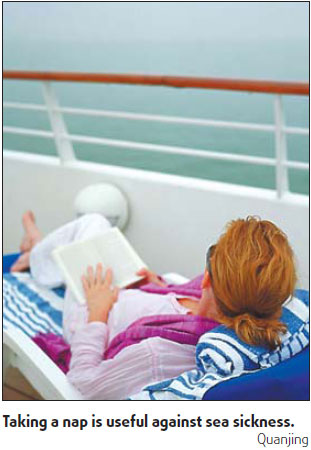
Kinetosis is caused when "the body experiences difficulty with different and contradictory stimuli", according to Michael Knappich, a doctor at the Berlin Center for Travel and Tropical Medicine.
The rocking motion experienced at sea causes a discrepancy between what the eye can see and what our body's sensory organs are telling our brains.
In the process, the body produces more histamines. According to a new theory by Reinhard Jarisch, an allergist from Vienna, histamines are the cause of the symptoms of sea sickness.
Almost everyone can be affected by sea sickness. But the degree to which individuals feel sick can vary greatly. "There are people who are very susceptible and those who don't have any problems at all," says Knappich.
People also react differently to the degree to which a boat rocks. "Some people feel very sick with just a small movement, while only a long, rolling movement will cause sea sickness in others," says Andreas Koch, a doctor at the German navy's medical institute in Kronshagen near Kiel.
However, on big ships, such movements no longer cause difficulties for passengers.There are a few things you can do to reduce the chances of feeling sea sick. "You should avoid alcohol and smoking at least a day before commencing your journey," Knappich advises.
On the day you set sail you should have slept enough and eaten small portions of food. "The stomach should be neither totally empty nor totally full."
It is also better to stay in mid-ship than at the bow or stern because that is where the sea swell is less pronounced.
If you do feel unwell, the best thing to do is go to the upper deck, get some fresh air and fix your gaze at a point on the horizon. It's more likely you will fall ill below deck. "That's where you will be looking at a vertical wall while your sensory organs are telling you the boat is rocking," says Koch.
Another good tip according to Koch is to, "lie down in your bunk as sleeping lowers your levels of histamines."
If you already know you are susceptible to sea sickness or the sea will be rough, you should take some medication before beginning the voyage.
"Antihistamines like diphenhydramine or dimenhydrinate are good for dealing with mild to severe symptoms," says Knappich.
For more severe symptoms, he recommends taking scopolamine or promethazine. If you have not taken anything, and you are hanging over the railing, then the best thing is to take a suppository with diphenhydramine or metoclopramid.
All of the above can cause drowsiness. In mild cases of sea sickness, sufferers should try some alternative forms of medication.
Ginger is one of the oldest traditional remedies. It appears to help in mild cases although there is no scientific proof. Sometimes, vitamin C can be useful. The German navy's medical institute is checking to see just how effective it is.
As vitamin C is known to break down histamines, it could have the same properties as anti-histamines, but without the associated side effects, says Koch.
taken from : China Daily



No comments:
Post a Comment